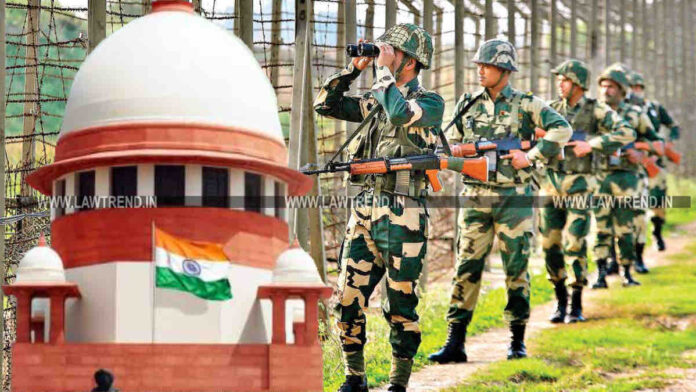The Supreme Court on Friday orally observed that the power of the Punjab Police has not been taken away by the Centre’s decision to expand the BSF’s jurisdiction to undertake search, seizure and arrest within a larger 50-km stretch from the International Border as compared to the earlier 15 km limit.
The bench comprising Chief Justice D Y Chandrachud and justices J B Pardiwala and Manoj Misra, hearing the 2021 lawsuit of the Punjab government, said the issues for adjudication by this court have to be settled.
It asked Solicitor General Tushar Mehta, appearing for the Centre, lawyer Shadan Farasat, representing the Punjab government, to sit together and jointly decide on issues to be decided by the bench.
“The parties shall exchange issues so that they can be settled before the next date of listing,” the bench said, adding the advocate general of Punjab can also take part in the meeting of parties.
After perusing the records, the CJI prima facie observed that there were concurrent powers to be exercised by the BSF and the state police. “The power of investigation is not taken away from the Punjab Police,” the CJI orally observed.
During a brief hearing, the solicitor general said the BSF has jurisdiction in all border states. He said in states like Gujarat, the jurisdiction of BSF was up to 80 km and now it is uniform 50 km in all border states.
The BSF has jurisdiction over some passport offences and the local police will also have power, the law officer said. Farasat said Punjab is a small state and the Centre’s decision takes away the power of the police and other agencies.
The solicitor general said the impugned notification does not include all the cognisable offences. Cognisable offences are those serious cases in which a police officer can arrest the suspect without any warrant.
Earlier in January 2021, the Punjab government moved the Supreme Court challenging the Centre’s decision that expanded the BSF’s jurisdiction to undertake search, seizure and arrest within a larger 50-km stretch from the international border in Assam, West Bengal and Punjab, as compared to the earlier 15 km.
The state government, in its original suit, said the extension of the territorial jurisdiction of the Border Security Force (BSF) encroaches upon the constitutional jurisdiction of the state.
The Union home ministry issued a notification amending a July, 2014 enabling provision for the BSF personnel and officers while they operate in the border areas.
While in Punjab, West Bengal and Assam, the BSF jurisdiction was enhanced from 15 km to 50 km, in Gujarat, which shares its borders with Pakistan, the limit was reduced from 80 km to 50 km, while in Rajasthan, it was kept unchanged at 50 km.
The issue had courted controversy as Opposition-ruled Punjab and West Bengal denounced the move and the respective state assemblies moved resolutions against the decision of the Union government.
In its suit, the Punjab government has said the “unilateral declaration” under the October 11 notification “without consulting” the state or without conducting any “consultative process” is violative of the provisions of the Constitution of India”.
“The defendant, all of a sudden, on October 11, 2021 without consulting the plaintiff — State of Punjab — or conducting any consultative process, issued the notification, whereby it amended the schedules of notifications dated July 3, 2014, September 22, 1969 and June 11, 2012 and increased the limit from 15 km to 50 km,” it has said.
The plea says the effect and consequence of the October 11 notification is that it “amounts to encroachment” upon the powers of the state by the Centre inasmuch as more than 80 per cent area of the border districts, all the major towns and cities, including all the district headquarters of these border districts, fall within a 50-km area from the Indo-Pakistan border.
Also Read
It says Punjab’s concerns are totally different and distinguishable from those of the Union territories of Jammu and Kashmir and Ladakh and the states of Gujarat and Rajasthan.
“It is submitted that the notification dated October 11, 2021 is ultra-vires the Constitution as it defeats the purpose of Entry 1 and 2 of List-II of Schedule 7 of the Constitution of India and encroaches upon plaintiff’s plenary authority to legislate on issues which relate to or are necessary for the maintenance of public order and internal peace,” the plea says.
The BSF has a strength of about 2.65 lakh personnel and it was raised on December 1, 1965.
It has 192 operational battalions and is the country’s largest border-guarding force, with the Indo-Tibetan Border Police (ITBP), the Sashastra Seema Bal (SSB) and the Assam Rifles being the other three.




